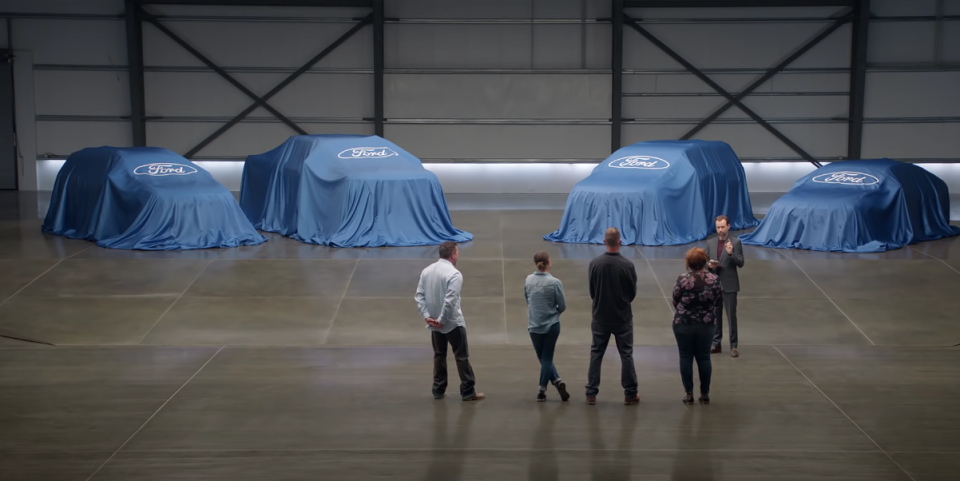Chevy Pulls Commercial Claiming Superior Reliability

UPDATE 1/18/19: Chevrolet stopped using the advertisement discussed in this opinion column following complaints about its claim to be the "most reliable" brand. The following story has been revised to reflect the controversy and developments after it originally posted.
If you were watching the NFL playoffs or the Golden Globes, you probably saw a new spot from Chevrolet in its "Real People. Not Actors" campaign.
In it, Chevy spokesperson Potsch Boyd asks a series of Ford, Honda, and Toyota owners if they'd be surprised to hear that their chosen make is the most reliable car company.
None of them appears to be surprised.
That is, until the aforementioned Mr. Boyd explains that "based on a recent nationwide survey, Chevy is more reliable than Toyota, Honda, and Ford."
Minds blown.

As it turns out, it wasn't just the owners of those competitive brands who were surprised, it was the manufacturers themselves. According to the Detroit Free Press and Detroit News, Ford, Honda and Toyota all challenged the accuracy of the claim, and Chevrolet subsequently said it would stop running the ad. Ford spokesman Mike Levine went so far as to tweet:
It’s understandable that the ‘real people’ in the commercial would be surprised with Chevrolet’s claim of being the most reliable car brand. Because it’s not the case. They have agreed to take these false and misleading ads down and we’d like to see that happen immediately.
- Mike Levine (@mrlevine) January 16, 2019
For its part, Chevrolet spokesperson Afaf Farah told the Free Press Wednesday that "Chevrolet stands by the reliability claim and the ad remains in the brand's toolbox, but we have decided to take it out of the regular rotation at this time to launch new Silverado creative."
Squabbling aside, you might be asking yourself, who's right? And why are these other manufacturers complaining now? After all, Chevy has been running the "Real People. Not Actors" campaign for years, and they all follow more or less the same script centered on a superiority claim.
There's a crucial difference in this one, and it's in the fine print-literally. In other ads in the series, Chevy prominently cites independent studies such as those by J.D. Power. In this one, Chevy includes a tiny disclaimer that appears for about three seconds (watch for it at the 0:46 mark) that tells you that the survey is based on 2015 model year vehicles, and "For Ipsos study information, visit ChevyReliability.com."
Once there, Chevy makes no mention of the fact that it commissioned the Ipsos survey and provides only a general description of the methodology. (It has since removed the link.)
The superiority claim was challenged almost immediately by a number of people, including the Massachusetts-based advocacy group Consumer World. Consumer World noted that in two independent studies by J.D. Power and Consumer Reports, that Chevy was not #1. In the Consumer Reports survey, Chevy ranked in the bottom quartile of manufacturers, and below each of the three competitors it claims superiority over.
So does that mean the Chevy claim is bogus?
Not necessarily.
First of all, broadcast claims are pretty well regulated, primarily via the Federal Communications Commission (FCC) as authorized under law. You can't just claim your cars are the most reliable or the highest quality without having substantial evidence to back up what you're saying. Otherwise the networks won't run the spots. They want to see robust proof of the claim. And not necessarily because they're such nice, selfless people, but because the network wants to sell commercials to other companies as well. If one were to make a baseless claim about another, the other company might pull its advertising. Or sue. Or both.
There's no reason to doubt that Chevy did, as it claims, commission global survey taker Ipsos to conduct a 50,000-vehicle survey and that that survey showed Chevy was #1 in reliability.
Does the fact that the Chevy surveys conflicts with some other reliability surveys mean one of them is wrong? Again, not necessarily. Any survey is based on criteria. Change the criteria and the results can change. Sometimes dramatically. In fact, while the Chevy survey and Consumer Reports survey used very different criteria, a 2018 J.D. Power study, conducted more like the one cited in the commercial (for instance, reflecting three years of service), ranked Chevrolet high in dependability. Not #1, but near the top of the industry and ahead of the Honda, Toyota, and Ford brands.
One can assume Chevy chose its criteria carefully.
But the real question is whether it's okay to commission one's own survey and barely reveal that fact in a brief and tiny note? Somewhere in America right now there are attorneys charging $800 an hour to debate that very point.
The late humorist Andy Rooney used to say, "Nothing in fine print is ever good news."
On that we can probably all agree.
('You Might Also Like',)

 Yahoo Autos
Yahoo Autos 